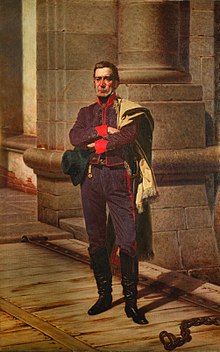Portal:Uruguay
| Portal | Participants | Templates | Tasks | Assessment | Popular Pages | Requests |
The Uruguay Portal
Uruguay (/ˈjʊərəɡwaɪ/ ⓘ YOOR-ə-gwy, Spanish: [uɾuˈɣwaj] ⓘ), officially the Oriental Republic of Uruguay (Spanish: República Oriental del Uruguay), is a country in South America. It shares borders with Argentina to its west and southwest and Brazil to its north and northeast, while bordering the Río de la Plata to the south and the Atlantic Ocean to the southeast. It is part of the Southern Cone region of South America. Uruguay covers an area of approximately 176,215 square kilometres (68,037 sq mi) and has a population of around 3.4 million, of whom nearly 2 million live in the metropolitan area of its capital and largest city, Montevideo. The area that became Uruguay was first inhabited by groups of hunter–gatherers 13,000 years ago. The predominant tribe at the moment of the arrival of Europeans was the Charrúa people, while there were also other tribes, such as the Guaraní and the Chaná, when the Portuguese first established Colónia do Sacramento in 1680; Uruguay was colonized by Europeans later than its neighboring countries. The Spanish founded Montevideo as a military stronghold in the early 18th century due competing claims over the region, while Uruguay won its independence between 1811 and 1828, following a four-way struggle between Portugal and Spain, and later Argentina and Brazil. It remained subject to foreign influence and intervention throughout the first half of the 19th century. From the late 19th century to the early 20th century, numerous pioneering economic, labor and social reforms were implemented, which led to the creation of a highly developed welfare state, which is why the country began to be known as "Switzerland of the Americas". However, a series of economic crises and the fight against far-left urban guerrilla warfare in the late 1960s and early 1970s culminated in the 1973 coup d'état, which established a civic-military dictatorship that lasted until 1985. Uruguay is today a democratic constitutional republic, with a president who serves as both head of state and head of government. Uruguay is ranked first in the Americas for democracy, and first in South America in peace, low perception of corruption, and e-government. It is the lowest-ranking South American nation in the Global Terrorism Index, and ranks second in South America on economic freedom, income equality, per capita income, and inflows of FDI. Uruguay is ranked third on the continent in terms of Human Development Index, GDP growth, innovation, and infrastructure. Uruguay is regarded as one of the most socially progressive countries in Latin America. It ranks high on global measures of personal rights, tolerance, democracy, and inclusion issues, including its acceptance of the LGBT community. The country has fully legalized cannabis (the first country in the world to do so) as well as same-sex marriage, prostitution, and abortion. It is a founding member of the United Nations, OAS, and Mercosur. (Full article...) Selected article -Fray Bentos (Spanish pronunciation: [fɾaj ˈbentos]) is the capital city of the Río Negro Department, in south-western Uruguay, at the Argentina-Uruguay border, near the Argentine city of Gualeguaychú. Its port on the Uruguay River is one of the nation's most important harbours. The city hosts the first campus of the Technological University, beside the historically relevant industrial complex Anglo, a World Heritage Site. One of the biggest pulp mills in the world is situated close to Fray Bentos and the Libertador General San Martín Bridge; it was the center of the largest political dispute between Uruguay and Argentina during the 21st century. (Full article...)Selected picture - Carlos Páez Vilaró's "Casapueblo." Punta Ballena, Maldonado, Uruguay. Did you know -
CategoriesSelect [►] to view subcategories
People -José Gervasio Artigas Arnal (Spanish pronunciation: [xoˈse xeɾˈβa.sjo aɾˈti.ɣas aɾˈnal]; June 19, 1764 – September 23, 1850) was a soldier and statesman who is regarded as a national hero in Uruguay and the father of Uruguayan nationhood. Born in Montevideo, Artigas enlisted in the Spanish military in 1797 and fought the British in the Anglo-Spanish War. At the outbreak of the Spanish-American wars of independence, Artigas supported the Primera Junta in Buenos Aires against Spain. He defeated the Spanish royalists at Las Piedras and laid siege to Montevideo, but was forced to withdraw in the face of Portuguese intervention. Artigas subsequently broke with the centralist government of Buenos Aires and took over Montevideo in 1815. He then oversaw the creation of the Federal League, an alliance of six provinces under a federal style of government. In 1816, the United Kingdom of Portugal, Brazil and the Algarves invaded the Banda Oriental, eventually annexing it as a province. Artigas was driven into Paraguay, where he lived in exile until his death in 1850. His remains were re-interred at the Central Cemetery of Montevideo in 1855, and in 1977 they were transferred to the Artigas Mausoleum. (Full article...)General imagesThe following are images from various Uruguay-related articles on Wikipedia.
Related portalsTopicsRecognized content
Featured articlesGood articlesAssociated WikimediaThe following Wikimedia Foundation sister projects provide more on this subject:
Award
Things you can do
Articles that need AttentionDiscover Wikipedia using portals | |||||||||||



























































